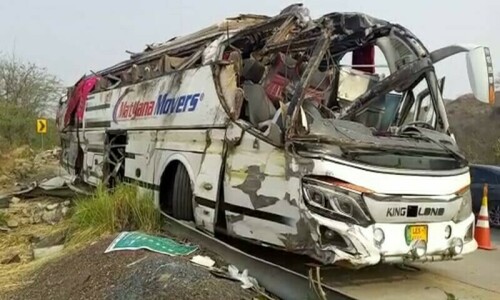Islamabad, Nov 19: The Human Rights Commission of Pakistan (HRCP) held a national consultation titled “Accountability Laws and Policies: the Way Forward” to bring together legal practitioners and civil society members to share their view on the improvement of the accountability and anti-corruption framework.
Reema Omer, International Legal Advisor to the International Court of Justice, set the context for the discussion on corruption and said that the International Anti-Corruption Seoul Conference in 2003 contended that corruption was a crime against humanity.
The HRCP contended that corruption attacked the fundamental values of human dignity and political equality of people. Therefore, there was an urgent need to strive for corruption-free state institutions.
Pakistan’s existing anti-corruption and accountability laws have undergone various facelifts such as the Prevention of Corruption Act 1947 to the Public and Representative Officers (Disqualification) Act 1950.
The measures have, however, been more to ensure who enters or stays in the corridors of power rather than to safeguard any public interest.
In a discussion ranging from the judicial system’s propensity to take action on corruption to the lack of accountability of various institutions, Matiullah Jan said, “Corruption is a far bigger evil than some court overstepping its bounds.”
Similarly, Khalid Saleem of USAID said corruption was present in all spheres of society.
I.A. Rehman, Secretary General of HRCP said, “Corruption requires an intent and attempt to provide an unwarranted benefit or to cause harm to someone,” he said.
Mukhtar Ahmed Ali, civil society activist, expanded on the theme that while corruption frequently brought up before courts was individual, corruption itself was systemic and the system protected it.
“There is a link between the right to information, transparency and then accountability,” he said.
He went on to critique the Freedom of Information Ordinance 2002 which he said was structurally flawed and requested that the new federal ordinance should be based on the law implemented in KP or the one proposed in Punjab.
Farhatullah Babar responded to Mukhtar’s comments by defending the proposed 2013 legislation stating that transparency was essential for accountability and this was only possible with an effective Right of Information Law.
Saroop Ijaz, advocate, said, “The discourse on corruption is not historic and it is not as simple as saying corruption is bad.”
He said the old legislations were the state’s way of controlling who entered the legislative chambers and there was a lack of credibility in the process which had to be ended.
Marvi Sirmed of UNDP added that corruption was effectively state capture by the powerful who took comparative advantages by circumventing existing rules.
I.A. Rehman summed up the day’s proceedings by saying that the topic was so vast that it could not be resolved in any one session. Nevertheless, he claimed the discussion was fruitful.













































